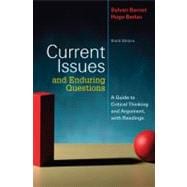The unique collaborative effort of a professor of English and a professor of philosophy, Current Issues and Enduring Questions is a balanced and flexible textbook that provides the benefits of the authors’ dual expertise in effective persuasive writing and rigorous critical thinking.
Refined through eight widely adopted editions, it has been revised to address current student interests and trends in argument, research, and writing. Its comprehensive coverage of classic and contemporary approaches to argument includes Aristotle, Toulmin, and a range of alternative views, making it an extraordinarily versatile text.
Readings on contemporary controversies (including environmental stewardship, student-teacher relationships, cyber bullying, and the limits of reproductive rights) and classical philosophical questions (such as How free is the will of the individual?) are sure to spark student interest and lively discussion and writing. No other text and reader offers such an extensive resource for teaching argument.









